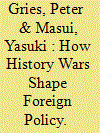|
|
|
Sort Order |
|
|
|
Items / Page
|
|
|
|
|
|
|
| Srl | Item |
| 1 |
ID:
087735


|
|
|
|
|
| Publication |
2009.
|
| Summary/Abstract |
Historical controversies continue to plague northeast Asian politics today, with Chinese and Koreans protesting Japanese history textbooks and Japanese politicians' visits to Yasukuni Shrine, and Koreans protesting Chinese claims that the ancient Kingdom of Goguryo was Chinese, not Korean. Yet, there is little empirical research exploring what, if any, impact historical beliefs have on threat perception and foreign policy preferences in northeast Asia today. On the basis of surveys of Chinese, Japanese, and South Korean university students, this paper explores the relationships among beliefs about the past, perceived threat in the present, and foreign policy preferences for the future. Results and their implications for northeast Asian security are discussed.
|
|
|
|
|
|
|
|
|
|
|
|
|
|
|
|
| 2 |
ID:
184755


|
|
|
|
|
| Summary/Abstract |
Do history wars shape international affairs? If so, how and for whom? Taking the historical dispute between China and South Korea over the ancient Gaogouli/Goguryeo Kingdom as a case study, this article explores the individual-level psychological micro-foundations of history wars. A 2020 survey experiment in South Korea pit “ours” vs “theirs” Goguryeo imitation Wikipedia entries to explore their downstream consequences. It revealed direct, indirect, and conditional effects. Exposure to China's claim to the Kingdom undermined Korean pride, increasing dislike of China, and lessening desires to cooperate with it. Pre-existing levels of nationalism divided South Koreans in how angry they became after exposure the Wikipedia primes. That anger, however, only shaped the China policy preferences of those South Koreans who viewed the balance of military power with China favorably. Implications for ownership disputes over kimchi and other national possessions are also discussed, as are the implications of history wars for war and peace in twenty-first-century East Asia.
|
|
|
|
|
|
|
|
|
|
|
|
|
|
|
|
|
|
|
|
|